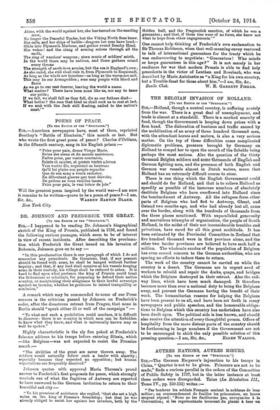DR. JOHNSON AND FREDERICK THE GREAT.
[To THE EDITOR or THE "SrzcTrroa.-] SIR, —I happened to be reading Dr. Johnson's biographical sketch of the King of Prussia, published in 1756, and found the following curious passages, which seem to be of interest in view of recent incidents. After describing the proclama- tion which Frederick the Great issued on his invasion of
Bohemia, Johnson goes on to say :-
"In this proclamation there is one paragraph of which I do not remember any precedents. He threatens, that, if any peasant should be found with arms, be shall be hanged without further inquiry ; and that, if any lord shall connive at his vassals keeping arms in their custody, his village shall be reduced to ashes. It is hard to find upon what pretence the king of Prussia could treat the Bohemians as criminals, for preparing to defend their native country, or maintaining their allegiance to their lawful sovereign against an invader, whether he professes to intend tranquillity or confusion."
A remark which may be commended to some of our Press censors is the criticism passed by Johnson on Frederick's order, after the disastrous retreat from Prague, that none in Berlin should " speak either ill or well of the campaign "
" To what end such a prohibition could conduce, it is difficult to discover : there is no country in which men can be forbidden to know what they know, and what is universally known may as well be spoken."
Highly characteristic is the sly fun poked at Frederick's fulsome address to his troops before entering Silesia, which —like Belgium—was not expected to resist the Prussian march :- "The civilities of the great are never thrown away. The soldiers would naturally follow such a leader with alacrity ; especially because they expected no opposition; but human expectations are frequently deceived."
Johnson quotes with approval Maria Theresa's proud answer to Frederick's first proposals for peace, which strongly reminds one of what the fugitives of Antwerp are reported to have answered to the German invitation to return to their beautiful sad city :-- "To his promises of assistance she replied, 'that she set a high value on the king of Prussia's friendship ; but that he was already obliged to assist her against her invaders, both by the Golden bull, and the Pragmatick sanction, of which he was a guarantee; and that, if these ties were of no force, she knew not what to hope from other engagements.'"
One cannot help thinking of Frederick's own exclamation to Sir Thomas Robinson, when that well-meaning envoy ventured to talk of international guarantees for the treaty which he was endeavouring to negotiate : " Guarantees ! Who minds
or keeps guarantees in this age P" It is not merely in her readiness for war that modern Prussia is able to find holy precedents in the victor of Leuthen and Rossbach, who was described by Marie Antoinette as "a King for his own country, but a Trouble-feast for those about him."—I am, Sir, &c.,


































 Previous page
Previous page